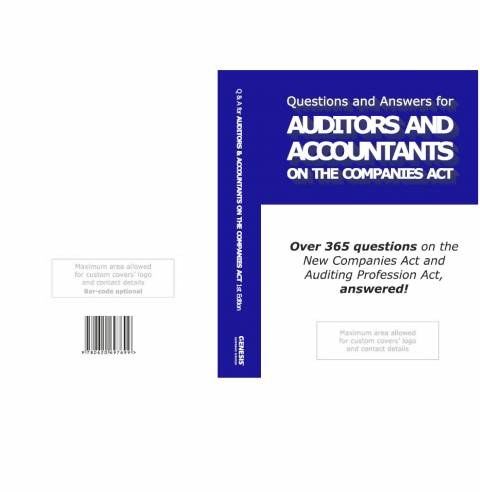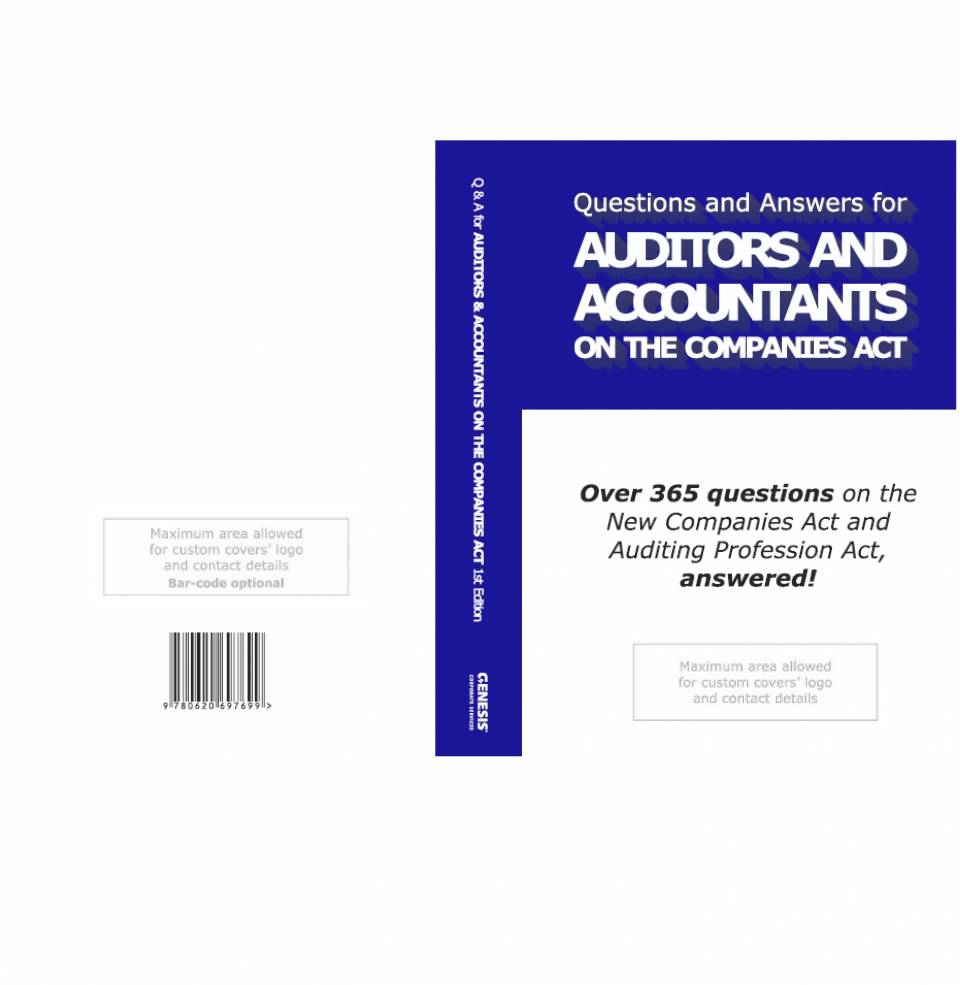Questions and Answers for Auditors and Accountants E-Book
New E-book available!
Soft copy version with your logo / corporate profile at no extra cost to you for the artwork (no plain covers permitted)
Special til 30 Sept
R
1,995.00
( R1,734.78 Excl VAT )
Some selected questions from the book
- What is meant by 'non-audit services'?
- What services are generally included in the audit which do not constitute audit services as understood in the context of the Companies Act 2008?
- Who is qualified to conduct an audit?
- Does the concept of accountability and transparency apply to all companies regardless of size?
- May a company secretary change the financial year end of a company?
- May a company file a change in financial year end for a financial year that already ended?
- What are the accounting records required for a profit company and a non-profit company in terms of section 28 of Companies Act 2008 and Companies Regulation 25?
- What are the ten requirements financial statements must meet in terms of section 29 of Companies Act 2008?
- What are the three statutory prohibitions on financial statements?
- What are the five notices that a summary of financial statements must bear on the first page of the summary?
- What is a statutory (non-voluntary) audit?
- What is a non-statutory (voluntary) audit?
- Who approves the annual financial statements of a company – the board of directors or the shareholders of the company?
- In what instances does the exemption of an audit for an owner-managed company fall away?
- What is the prescribed minimum information that must be included in annual financial statements?
- What is the time period within which a company must prepare annual financial statements?
- May any company director sign the annual financial statements of their company?
- What are the implications of being an owner-managed company in terms of section 30(2A) of Companies Act 2008?
- What is the difference between an owner-managed company and an owner-managed close corporation, where an owner is or the owners are a trust/s?
- Does a judgment creditor of a company have access to the annual financial statements of that company?
- Who may perform an independent review of the annual financial statements of a company or a close corporation?
- What are the factors influencing the decision to conduct an audit or independent review?
- Which categories of companies are required to have their annual financial statements independently reviewed?
- May a compiler and an independent reviewer be two qualifying professionals from the same accounting firm?
- Are independent reviewers required to be rotated similar to auditors?
- Is an independent review practitioner allowed to perform an independent review of a company’s annual financial statements if he prepared those financial statements?
- How does one calculate the public interest score calculation in relation to a profit company versus a non-profit company
- When a beneficial interest holder is also an employee of the company, is he counted twice for the public interest score?
- What are the foreseen difficulties regarding the issue of calculating the public interest score of a company at the end of each financial year?
- What are the financial reporting standards for profit and non-profit companies in terms of Companies Regulation 27?
- What does the term “reportable irregularity” mean in terms of the Auditing Profession Act 2005 and the Companies Regulations?
- What is the statutory process that an independent review practitioner must follow on reporting an irregularity?
- When must a company file audited financial statements and reviewed financial statements with its annual returns?
- Under what circumstances must the Companies Commission (CIPC) deregister a company or an external company?
- What is the audit tenure disclosure rule which has been prescribed by the Independent Regulatory Board for Auditors (IRBA) and published in Government Gazette 39475 of 4 December 2015?
- How is mandatory audit firm rotation (MAFR) been implemented in South Africa?
- What are the concerns regarding mandatory audit firm rotation (MAFR)?
- Is the auditor rotation contemplated in section 92 of Companies Act 2008 mandatory?
- If a firm has multiple auditors, is it only the individual auditor that needs to rotate, or does section 92 of Companies Act 2008 apply to the firm as well?
- Is the statutory rotation of auditors after a period of five years only applicable to statutory audits, voluntary audits or independent reviews?
- In the event that a company has appointed two persons as joint auditors, must they both resign at the 5-year mark contemplated in section 92 of Companies Act 2008?
- How will the IRBA monitor the disclosure of audit tenure?
- What is an illustrative example of an independent auditor’s report containing the mandatory disclosure of audit tenure?
- May a registered auditor perform an audit without a risk management plan?
- What are the duties and liabilities of the registered auditor in terms of the Companies Act 71 of 2008 as amended, and the Auditing Profession Act 26 of 2005?
- Under what circumstances is an individual disqualified from being registered as an auditor by the regulatory board?
- May an individual, who is not a registered auditor, perform an audit in association with a registered auditor who is entitled to perform the audit?
- May funds of a client be retained by an accountant as security for his fees?
- May an existing accountant retain documents of a client who has not paid the fees owing to him?
- What are the circumstances where a registered auditor may be required to disclose confidential information of a client?
- Under what circumstances does a registered auditor incur liability in terms of the Auditing Profession Act, 26 of 2005 as amended?
- Under what circumstances does a registered auditor incur liability in terms of the Companies Act, 71 of 2008 as amended
- What are the three types of audit offences which are punishable by either payment of a fine, imprisonment or both in terms of the Auditing Profession Act 2005?
- The effective date of Companies Act, 71 of 2008, was 1 May 2011. When is section 90 effective?
- Is an auditor allowed to perform an audit where he has previously prepared a client’s financial statements?
- Can one partner of an audit firm be responsible for the compilation of the annual financial statements and another partner of the same firm be responsible for the audit of the set of annual financial statements?
- Is an auditor allowed to perform an audit if he has assisted with adjusting entries or framing financial statements from existing records?
- Section 90(2)(b)(iv) of Companies Act 2008 also states that the person or firm appointed as the auditor may not perform the prohibited services any time during the previous 5 years. When does the 5 years commence? Is this 5-year period a rolling window?
- When is the appointment of a company secretary, an auditor and an audit committee compulsory for a private company, personal liability company and non-profit company?
- What are the secretarial requirements for the appointment and resignation of auditors?
- Does the auditor of a holding company have the right of access to any former financial statements of a subsidiary of that company?
- What are key audit matters (KAM)?
- How will auditors determine key audit matters?
- Is a member of an audit committee allowed to be a director of that company?
-
Appendices in the book
-
PLUS the Auditing Profession Act, Act No. 26 of 2005 including amendments from the Auditing Profession Amendment Act, No. 2 of 2015


Specifications
| Over 365 Questions and Answers | |
| A 5 | |
| ~ 530 Pages | |
| Includes: Auditing Profession Act 2005 with amendments from the Auditing Profession Amendment Act 2015 |